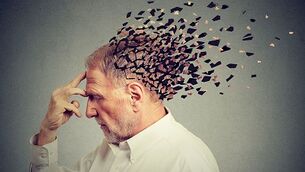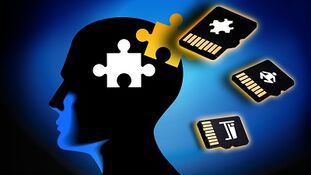
There are diametrically opposed views on drugs to improve memory. Some say it is beneficial and helps cope with increased intellectual stress, it is really helpful and effective.
Others say that this is just a myth, there is no use in taking such drugs, even these drugs can be harmful and addictive. Let's consider both perspectives in more detail and find out who is right.
A little bit about memory
Memory is a mental function of higher neural activity with the help of the accumulation, preservation and reproduction of previously received information. The memory allows you to record long-term information about the outside world or the body's response to any influence, and also allows you to use this information for the correct organization of activities in the future.
Memory contains several different but associated processes.
- Memorization- new data entry, sensations.
- Storage- includes data accumulation, sensations, their processing and digestion. This process enables the person to learn, improve their thinking and speaking.
- Reproduction and recognition- realization of items, actions, sensations from the past. Reproduction is involuntary (the elements "float" in one's mind without will or effort) and arbitrary.
- Don't Forget- loss of ability to reproduce and recognize previously memorized items. It can be temporary or permanent. There is incomplete forgetting when information is duplicated or recognized by an error or partially.
Basic memory types
There are many types and subtypes in thememory classification. Let's talk about its main types.
- Sensory memory- preservation of information from the senses after stimulating the senses.
- Tactile memory- protection of information from recipients as a result of touch.
- Engine memory- while recording information about movement, most people can remember that they are the movements they perform automatically.
- Semantic memory- recording information about facts, eg stories learned, dates, multiplication table.
- Short-term memory- save information for a short time. It has a small volume.
- Long-term memory- to store information indefinitely, including all life.
Memory Laws

Few people know that there are memory laws. This is not the author's invention, but scientifically established and proven real-life patterns.
- Law of Repetition- information is remembered much better if repeated several times.
- Law of Interest- If a person is interested in information, he will remember it faster and better.
- Edge Law- information given at the beginning and at the end is best remembered.
- Law of Understanding- if the information is deeply understood then it will be better remembered.
- Optimal line length law- the amount of memorized information should not exceed the short-term memory.
- Installation Law- A person who gives himself the installation he needs to remember this or that information will remember it faster and better.
- Blocking law- when memorizing similar concepts, old knowledge "overlaps" with new.
- Law of Context- progresses faster when memorizing things that can be associated with already familiar concepts.
- Law of Action- if what is memorized is used in practice, memorization will be more efficient and faster.
These laws can be used if you want to remember something faster and better and improve your memory.
Causes of memory loss
- Organic brain injury- acute cerebrovascular accident, traumatic brain injury, brain tumor.
- Other organ and system diseases- liver diseases, cardiovascular system.
- External factors- bad ecology, a sharp change in the surrounding conditions of existence, stress, sleep disturbances.
- Age-related changes in the structure of the brain- reduction in the number of connections between neurons.
- Chronic poisoning- smoking, drug use, substance abuse, alcoholism, drug use (tranquilizers, tranquilizers).
Treatment of memory impairments
Medications are not prescribed immediately if memory needs improvement. First, they try to apply non-drug methods. These include:
- Walks in brisk fresh air. This increases oxygen's access to the brain. This increases the efficiency of his work.
- Normalize sleep and alertness.
- Evening training- the habit of recalling all the events of the day in reverse order, that is, first of all in the evening and at the end - morning events can become an unusual training. It is better to do this before going to bed, in bed.
- Positive attitude, don't dwell on it- don't think your memory is bad, nobody canceled the effect of self-hypnosis. If at some point you can't remember something, don't worry, don't get angry, just distract, do something else and then try to remember what you forgot again.
- Daily exercises- solve puzzles, crosswords, scanned words.
- Education- learn poetry, foreign languages, do it regularly, gradually increase the amount of material you learn.
Medicine for memory loss

It is clear that learning poetry, foreign languages, solving puzzles is not easy, you have to "push", extra time to walk and solve puzzles that a working person does not have in practice.
It is much easier to take a pill, calm down and hope for the magic power of the medicine - your memory will improve immediately and you won't have to do anything! A modern city dweller is so lazy and spoiled by the fruits of civilization that now few people are so purposeful and want to spend their time and energy on training memory. So a person is looking for an answer to his question - what pills are there to improve memory?
So let's consider two opposite views on this matter:
Positive opinion
Supporters of the use of these funds say that a number of drugs help improve blood flow to brain cells, thereby improving their nutrition and providing more oxygen that improves metabolic processes in neurons.
Nootropics and drugs that improve the rheological properties of blood help in this regard.
Herbal preparations have become widespread, this not only improves metabolic processes in neurons, but also enhances the effect of nootropic drugs.
But it should be remembered that any drug (absolutely any) has its own contraindications and side effects, so it should only be prescribed by a doctor in each clinical situation.
Negative opinion
According to some experts, the coin has a downside. A few years ago, experts were puzzled by the question - are these drugs effective or just a placebo effect?
As a result of numerous studies, the effectiveness of nootropics has not been proven. There is no evidence that they have a beneficial effect on memory. One of the small studies on the effectiveness of the drugs has proven that they have little effect but not in severe cases.
There is almost no research on traditional methods and herbal preparations such as ginseng, vitamin E. The evidence base is for the use of herbal remedies in dementia patients only. However, there is no data on the effectiveness of use in relatively healthy people.
In conclusion, when considering which drugs are best for improving memory, remember that they should be prescribed by your doctor. And the doctor must also evaluate the effectiveness in any case. Do not rely on advice from friends, neighbors or relatives.
If you think your memory is getting worse, see a neurologist. Perhaps this is not the problem at all, there may be distractions, other problems. The reason for this situation must also be found. And this can only be done by a qualified doctor.








































































